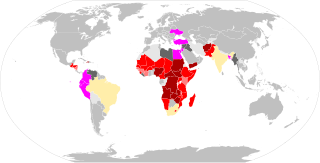
John Maynard Keynes, 1st Baron Keynes was an English economist and philosopher whose ideas fundamentally changed the theory and practice of macroeconomics and the economic policies of governments. Originally trained in mathematics, he built on and greatly refined earlier work on the causes of business cycles. One of the most influential economists of the 20th century, he produced writings that are the basis for the school of thought known as Keynesian economics, and its various offshoots. His ideas, reformulated as New Keynesianism, are fundamental to mainstream macroeconomics. He is known as the "father of macroeconomics".

The poverty threshold, poverty limit, poverty line, or breadline is the minimum level of income deemed adequate in a particular country. The poverty line is usually calculated by estimating the total cost of one year's worth of necessities for the average adult. The cost of housing, such as the rent for an apartment, usually makes up the largest proportion of this estimate, so economists track the real estate market and other housing cost indicators as a major influence on the poverty line. Individual factors are often used to account for various circumstances, such as whether one is a parent, elderly, a child, married, etc. The poverty threshold may be adjusted annually. In practice, like the definition of poverty, the official or common understanding of the poverty line is significantly higher in developed countries than in developing countries.

In sociology and in economics, the term conspicuous consumption describes and explains the consumer practice of buying and using goods of a higher quality, price, or in greater quantity than practical. In 1899, the sociologist Thorstein Veblen coined the term conspicuous consumption to explain the spending of money on and the acquiring of luxury commodities specifically as a public display of economic power—the income and the accumulated wealth—of the buyer. To the conspicuous consumer, the public display of discretionary income is an economic means of either attaining or of maintaining a given social status.

Ernst Friedrich Schumacher was a German-British statistician and economist who is best known for his proposals for human-scale, decentralised and appropriate technologies. He served as Chief Economic Advisor to the British National Coal Board from 1950 to 1970, and founded the Intermediate Technology Development Group in 1966.

International inequality refers to inequality between countries, as compared to global inequality, which is inequality between people across countries. International inequality research has primarily been concentrated on the rise of international income inequality, but other aspects include educational and health inequality, as well as differences in medical access. Reducing inequality within and among countries is the 10th goal of the UN Sustainable Development Goals and ensuring that no one is left behind is central to achieving them. Inequality can be measured by metrics such as the Gini coefficient.
Income segregation is the separation of various classes of people based on their income. For example, certain people cannot get into country clubs because of insufficient funds. Another example of income segregation in a neighborhood would be the schools, facilities and the characteristics of a population. Income segregation can be illustrated in countries such as the United States, where racial segregation is a major cause of income inequality.

In the United States, poverty has both social and political implications. In 2020, there were 37.2 million people in poverty. Some of the many causes include income inequality, inflation, unemployment, debt traps and poor education. The majority of adults living in poverty are employed and have at least a high school education. Although the US is a relatively wealthy country by international standards, it has a persistently high poverty rate compared to other developed countries due in part to a less generous welfare system.

The causes of poverty may vary with respect to nation, region, and in comparison with other countries at the global level. Yet, there is a commonality amongst these causes. Philosophical perspectives, and especially historical perspectives, including some factors at a micro and macro level can be considered in understanding these causes.

Lisa Louise McKenzie is a British anarchist and senior lecturer at the University of Bedfordshire whose work relates to class inequality, social justice, and British working class culture. She was active in the Class War party and her research and politics have been influenced by being a working-class mother of a mixed-race child in a poor area of Nottingham where she grew up.

The COVID-19 pandemic affected educational systems across the world. The number of cases of COVID-19 started to rise in March 2020 and many educational institutions and universities underwent closure. Most countries decided to temporarily close educational institutions in order to reduce the spread of COVID-19. UNESCO estimates that at the height of the closures in April 2020, national educational shutdowns affected nearly 1.6 billion students in 200 countries: 94% of the student population and one-fifth of the global population. Closures are estimated to have lasted for an average of 41 weeks. They have had significant negative effects on student learning, which are predicted to have substantial long-term implications for both education and earnings. During the pandemic, education budgets and official aid program budgets for education have decreased.

During the COVID-19 pandemic emergency, a number of non-pharmaceutical interventions colloquially known as lockdowns were implemented in numerous countries and territories around the world. These restrictions were established with the intention to reduce the spread of SARS-CoV-2, the virus that causes COVID-19. By April 2020, about half of the world's population was under some form of lockdown, with more than 3.9 billion people in more than 90 countries or territories having been asked or ordered to stay at home by their governments. Although similar disease control measures have been used for hundreds of years, the scale of those implemented in the 2020s is thought to be unprecedented.

The COVID-19 pandemic has impacted the mental health of people across the globe. The pandemic has caused widespread anxiety, depression, and post-traumatic stress disorder symptoms. According to the UN health agency WHO, in the first year of the COVID-19 pandemic, prevalence of common mental health conditions, such as depression and anxiety, went up by more than 25 percent. The pandemic has damaged social relationships, trust in institutions and in other people, has caused changes in work and income, and has imposed a substantial burden of anxiety and worry on the population. Women and young people face the greatest risk of depression and anxiety.

COVID-19 affects men and women differently both in terms of the outcome of infection and the effect of the disease upon society. The mortality due to COVID-19 is higher in men. Slightly more men than women contract COVID with a ratio of 10:9.

The COVID-19 pandemic has had an impact on the environment, with changes in human activity leading to temporary changes in air pollution, greenhouse gas emissions and water quality. As the pandemic became a global health crisis in early 2020, various national responses including lockdowns and travel restrictions caused substantial disruption to society, travel, energy usage and economic activity, sometimes referred to as the "anthropause". As public health measures were lifted later in the pandemic, its impact has sometimes been discussed in terms of effects on implementing renewable energy transition and climate change mitigation.
According to data from 2010, low-income earners make up 37.8% of South Korea's labour force. Conversely, the highest income earners make up 1.4% of the labour force.

A systematic review notes that children with COVID-19 have milder effects and better prognoses than adults. However, children are susceptible to "multisystem inflammatory syndrome in children" (MIS-C), a rare but life-threatening systemic illness involving persistent fever and extreme inflammation following exposure to the SARS-CoV-2 virus.

During the COVID-19 pandemic, food insecurity has intensified in many places – in the second quarter of 2020 there were multiple warnings of famine later in the year. In an early report, the Nongovernmental Organization (NGO) Oxfam-International talks about "economic devastation" while the lead-author of the UNU-WIDER report compared COVID-19 to a "poverty tsunami". Others talk about "complete destitution", "unprecedented crisis", "natural disaster", "threat of catastrophic global famine". The decision of WHO on March 11, 2020, to qualify COVID as a pandemic, that is "an epidemic occurring worldwide, or over a very wide area, crossing international boundaries and usually affecting a large number of people" also contributed to building this global-scale disaster narrative.

This article documents the chronology of the response to the COVID-19 pandemic in October 2020, which originated in Wuhan, China in December 2019. Some developments may become known or fully understood only in retrospect. Reporting on this pandemic began in December 2019.
The COVID-19 pandemic has had an unequal impact on different racial and ethnic groups in the United States, resulting in new disparities of health outcomes as well as exacerbating existing health and economic disparities.
The COVID-19 pandemic in the Australian Capital Territory is part of the ongoing worldwide pandemic of the coronavirus disease 2019 caused by severe acute respiratory syndrome coronavirus 2. After one case of the delta variant in mid-August 2021, the Territory went into lockdown. By 26 September, the ACT had its first COVID-19 related death since mid-April 2020, nearly 18 months, followed by 3 more deaths in the first week of October 2021. 28 deaths during the outbreak since 12 August 2021 brought total deaths to 31, the most recent being on 8 February 2022.













